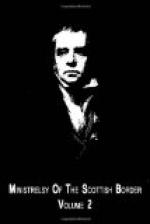“If I be guilty,” said Hughie
the Graeme,
“Of me my friends shall hae
small talk;”
And he has loup’d fifteen feet and
three,
Though his hands they were tied
behind his back.
He looked over his left shoulder,
And for to see what he might see;
There was he aware of his auld father,
Came tearing his hair most piteouslie.
“O hald your tongue, my father,”
he says,
“And see that ye dinna weep
for me!
“For they may ravish me o’
my life,
“But they canna banish me
fro’ heaven hie.’
“Fare ye weel, fair Maggie, my wife!
“The last time we came ower
the muir,
“’Twas thou bereft me of my
life,
“And wi’ the Bishop
thou play’d the whore.
“Here, Johnie Armstrang, take thou
my sword,
“That is made o’ the
metal sae fine;
“And when thou comest to the English[C]
side,
“Remember the death of Hughie
the Graeme.”
[Footnote A: Garlard—Anc. Songs.]
[Footnote B: Boles—Anc. Songs.]
[Footnote C: Border—Anc, Songs.]
NOTE ON HUGHIE THE GRAEME.
And wi’ the Bishop thou play’d the whore.—P. 326, v. 9.
Of the morality of Robert Aldridge, bishop of Carlisle, we know but little; but his political and religious faith were of a stretching and accommodating texture. Anthony a Wood observes, that there were many changes in his time, both in church and state; but that the worthy prelate retained his offices and preferments during them all.
JOHNIE OF BREADISLEE.
AN ANCIENT NITHESDALE BALLAD.
The hero of this ballad appears to have been an outlaw and deer-stealer—probably one of the broken men residing upon the border. There are several different copies, in one of which the principal personage is called Johnie of Cockielaw. The stanzas of greatest merit have been selected from each copy. It is sometimes said, that this outlaw possessed the old castle of Morton, in Dumfries-shire, now ruinous:—“Near to this castle there was a park, built by Sir Thomas Randolph, on the face of a very great and high hill; so artificially, that, by the advantage of the hill, all wild beasts, such as deers, harts, and roes, and hares, did easily leap in, but could not get out again; and if any other cattle, such as cows, sheep, or goats, did voluntarily leap in, or were forced to do it, it is doubted if their owners were permitted to get them out again.”—Account of Presbytery of Penpont, apud Macfarlane’s MSS. Such a park would form a convenient domain to an outlaw’s castle, and the mention of Durrisdeer, a neighbouring parish, adds weight to the tradition. I have seen, on a mountain near Callendar, a sort of pinfold, composed of immense rocks, piled upon each other, which, I was told, was anciently constructed for the above-mentioned purpose. The mountain is thence called Uah var, or the Cove of the Giant.




